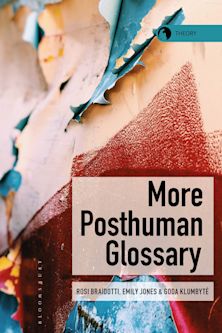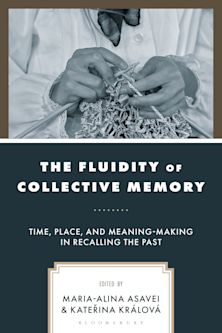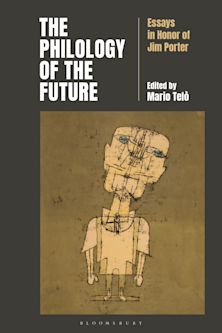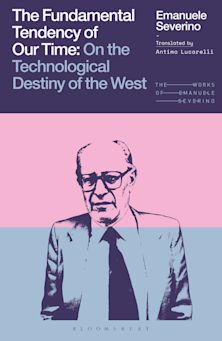- Home
- ACADEMIC
- Philosophy
- Continental Philosophy
- On the Feminist Philosophy of Gillian Howie
On the Feminist Philosophy of Gillian Howie
Materialism and Mortality
On the Feminist Philosophy of Gillian Howie
Materialism and Mortality
You must sign in to add this item to your wishlist. Please sign in or create an account
Description
Over three decades, Gillian Howie wrote at the forefront of philosophy and critical theory, before her untimely death in 2013. This interdisciplinary collection uses her writings to explore the productive, yet often resistant, interrelationship between feminism and critical theory, examining the potential of Howie's particular form of materialism. The contributors also bring to this debate a serious engagement with Howie's late turn towards philosophies of mortality, therapy and 'living with dying'. The volume considers how differently embodied subjects are positioned within public institutions, discourses and spaces, and the role of philosophy, art, film, photography, and literature, in facing situations such as sexual oppression and life-limiting illness.
Table of Contents
Notes on the Contributors
Editors' Introduction
Gillian Howie's Philosophies of Embodied Practice, Victoria Browne and Daniel Whistler
Part One: Feminism, Materialism, Critical Theory
Chapter One
When Feminist Philosophy Met Critical Theory: Gillian Howie's Historical Materialism, Stella Sandford
Chapter Two
Feminist Knowledge and Feminist Politics: Reflections on Howie and Late Feminism, Kimberly Hutchings
Chapter Three
Between Negative Dialectics and Sexual Difference: Generative Conjunctures in the Thinking of Gillian Howie, Joanna Hodge
Chapter Four
Scholarly Time and Feminist Time: Gillian Howie on Education and Intellectual Inheritance, Victoria Browne
Chapter Five
The Cloistered Imaginary, Daniel Whistler
Part Two: Living with Dying
Chapter Six
How to Think about Death: Living with Dying, Gillian Howie
Chapter Seven
Gillian Howie's Situated Philosophy: Theorizing Living and Dying 'In Situation', Christine Battersby
Chapter Eight
The Relationality of Death, Alison Stone
Chapter Nine
Reflections on 'Living up to Death', Morny Joy
Chapter Ten
Learning to Die, Finally, Claire Colebrook
Chapter Eleven
'What the Living Do': Poetry's Death and Dying, Deryn Rees-Jones
Chapter Twelve
Cancer Sucks: Photography and the Representation of Chronic Illness, Nedim Hassan
Chapter Thirteen
Movie-making as Palliative Care, Amy Hardie
Chapter Fourteen
Experience and Performance whilst Living with Disability and Dying: Disability Art as a Pathway to Flourishing, Janet Price and Ruth Gould
Index
Product details

| Published | 20 Oct 2016 |
|---|---|
| Format | Ebook (PDF) |
| Edition | 1st |
| Extent | 304 |
| ISBN | 9781474254137 |
| Imprint | Bloomsbury Academic |
| Publisher | Bloomsbury Publishing |
About the contributors
Reviews
-
The volume's strongest point is its trajectory: earlier essays engage deeply with Howie's published and unpublished work, and later chapters move beyond her work into discussions inspired by her thoughts ... Browne and Whistler's volume takes Howie's philosophy into the future.
Hypatia Reviews
-
[A] rich and vibrant book of writings.
Radical Philosophy
-
This collection offers a fitting tribute to the variety of themes that formed the life's work of Gillian Howie. The very richness of the contributions allow for the kind of flourishing discourse Howie did so much to promote. A vital read.
Beverley Clack, Professor of Philosophy of Religion, Oxford Brookes University, UK
-
Gillian Howie's all too brief philosophical life was dominated by the struggle for emancipation, both personal and political. This distinguished and deeply engaged collection of essays covers with critical sympathy the remarkable scope of her work, and will be invaluable as an introduction to the alternative and feminist philosophical tradition Howie was living up to her death.
Michael McGhee, Honorary Senior Fellow, Department of Philosophy, University of Liverpool, UK

ONLINE RESOURCES
Bloomsbury Collections
This book is available on Bloomsbury Collections where your library has access.



































